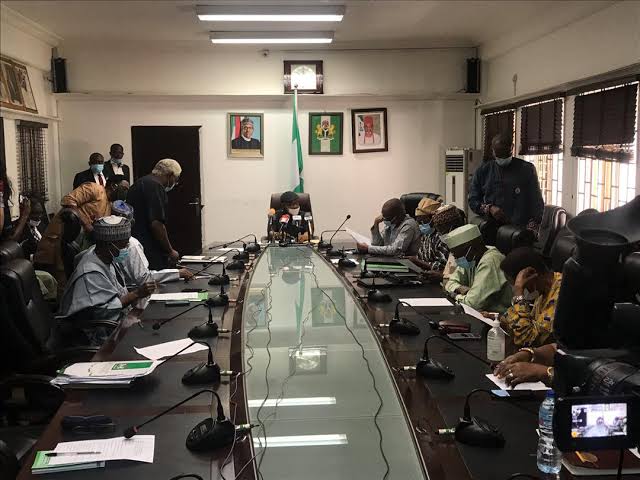Why we rejected the federal governmentŌĆÖs salary structure

The Academic Staff Union Of Universities (ASUU) has explained why it rejected the federal governmentŌĆÖs offer regarding the university salary structure.
Recall that during the resumed meeting of the Renegotiation Committee of the Federal Government of Nigeria (FGN) and ASUU 2009 Agreement on Tuesday, August 16, 2022, the government team presented an ŌĆ£awardŌĆØ of a structure Recommended Consolidated University Salary (CONUASS) prepared by the National Commission on Wages, Incomes and Wages (NSIWC) at ASUU.
But, in a press release signed by ASUU President Prof. Emmanuel Osodeke, which was made available to LEADERSHIP, the Union strongly rejected the ŌĆ£AwardŌĆØ.
He said that the FGN-ASUU agreement of 1981, under the administration led by Shehu Shagari, established the principle of collective bargaining, based on Decree No. 1 of 1973 of the wages commissions and the industrial council, of Labor Disputes Act (1976), ILO Conventions 49 (1948), 91(1950), 154 (1988) and Recommendation 153 (1981), Report of the Udoji Commission of 1974 and Report of the Commission Cookey from 1981.
The statement reads in several parts: ŌĆ£It also provided a platform to address such important issues as special salaries and conditions of service for university staff, university funding, the roles of pro-chancellors, vice-chancellors -Chancellors and the National Universities Commission (NUC). One of the main results was a special salary scale for academic staff known as the Academic Salary Structure (USS).
ŌĆ£At the commencement of the renegotiation of the 2009 FGN/ASUU agreement on March 16, 2017, the Federal Government and ASUU teams agreed to be guided by the following principles as their mandate, which includes reversing the decadence of the Nigerian University system, in order to reposition it in its national development responsibilities.
ŌĆ£Reversing the brain drain, not only by improving the remuneration of academic staff, but also by relieving them of the burdens of a unified civil service salary structure; (iii) the restoration of Nigerian universities, through immediate, massive and sustained financial intervention; and ensuring genuine university autonomy and academic freedom.
ŌĆ£The governmentŌĆÖs surreptitious decision to set aside the principle of collective bargaining, which is in practice globally, has the potential to damage the psyche of faculty and destroy commitment to the university system. This is, no doubt, detrimental to NigeriaŌĆÖs aspiration to become an active player in the global knowledge industry.
ŌĆ£Rejecting a wage package obtained through collective bargaining is a repudiation of government claims about reversing the ’┐Į?brain drainŌĆÖ. It is common knowledge that, more now than in the 1980s and 1990s, Nigerian scholars, especially in rare fields like science and medicine, are migrating en masse to Europe, America and many parts of the world. Africa such as South Africa, Rwanda and Ghana with conducive environment to practice their trades as well as competitive reward systems for intellectual efforts. Does the Nigerian government care what will happen to public universities in five or ten years if this trend continues? ┬╗
Osodeke said the federal governmentŌĆÖs repudiation of collective bargaining was in bad faith, adding that it is a retrograde step for a democratic government to repeal the principle of collective bargaining after more than 40 years of its introduction into the Nigerian university system.
He added, ŌĆ£The government imposed the ongoing strike on ASUU and encouraged it to linger due to its provocative indifference. The renegotiation committee led by Munzali Jibril submitted the first draft agreement in May 2021, but the official response from the government did not come until about a year later! Again, the ŌĆ£AwardŌĆØ presented by the team led by Nimi Briggs came in the form of a take it or leave it piece of paper. No serious country in the world treats its scholars this way.
He lamented that it was an unnecessary expense, an embezzlement and an outright theft of the collective heritage.
ŌĆ£ASUU believes that if the leaks in the management of the countryŌĆÖs resources are stopped, there will be more than enough to meet the nationŌĆÖs revenue and expenditure targets without
borrow and plunge the country into a debt crisis as it is now.
ŌĆ£The new draft agreement contains other major recommendations for the financing of the main components of the FGN/ASUU agreement renegotiated in 2009.
ŌĆ£One of these recommendations is the tax on cell phones and communication lines. Ironically, the Federal Ministry of Finance, Budget and National Planning recently announced that it was ready to implement the ASUU recommendation, as a source of revenue, but not for education, without acknowledging the Union,ŌĆØ he added.
The ASUU President further urged the Federal Government, through the Ministry of Education, to return to the new draft agreement of the FGN/ASUU Renegotiation Committee of 2009, the work of which took five years. and a half in total, as a sign of good faith.









